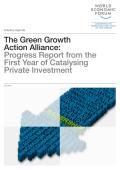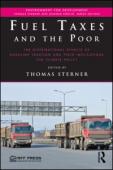
At the World Economic Forum Annual Meeting 2013 in Davos-Klosters, three leading economic voices – the presidents of the International Monetary Fund and the World Bank and the Secretary-General of the Organisation for Economic Co-operation and Development – delivered the troubling message that it will not be possible to emerge from the current global economic crisis without addressing resource scarcity and climate change. The Forum’s Global Risks 2013 report echoed these views, with climate change emerging as one of the top global risks faced by mankind. It is in this context that the Green Growth Action Alliance was created during the World Economic Forum hosted Mexican B20 process and was formally endorsed at the the Los Cabos G20 Summit, June 2012, with the goal to scale up private investment in green growth. In January the Alliance also issued the Green Investment Report 2013, which identified the size of the gap in the investment required.
This report asks whether and how this transformation could become an economic opportunity rather than a costly burden. Could a transformation to a low-carbon energy system induce net economic growth that can ease the transition to a low carbon economy? Or must it only be a pricey impediment whose costs offer support to those who would resist change? We address three aspects of this problem:
1. What are the proper roles for markets, prices, and governments in the move to a new energy system?
2. Which policy interventions can become investments in a productive future, and which are just costs that we must bear to achieve our other policy objectives?
3. Can the shift to low-carbon, high-efficiency energy drive “green growth” and business opportunity?
This report contains 7 case studies from various countries and regions, and their strategies to shape green growth, as well as the obstacles encountered. These green growth cases cover Brazil, California, China, Colorado, Denmark, the EU, and Korea.

This book challenges the conventional wisdom that gasoline taxation, an important and much-debated instrument of climate policy, has a disproportionately detrimental effect on poor people. Increased fuel taxes carry the potential to mitigate carbon emissions, reduce congestion, and improve local urban environment. As such, higher gasoline taxes could prove to be a fundamental part of any climate action plan. However, they have been resisted by powerful lobbies that have persuaded people that increased fuel taxation would be regressive. Reporting on examples of over two dozen countries, this book sets out to empirically investigate this claim. The authors conclude that while there may be some slight regressivity in some high-income countries, as a general rule, fuel taxation is a progressive policy particularly in low income countries. Rich countries can correct for regressivity by cutting back on other taxes that adversely affect poor people, or by spending more money on services for the poor. Meanwhile, in low-income countries, poor people spend a very small share of their money on fuel for transport.
The European Commission and the International Labour Organization have combined efforts in reaction to the deep crisis that hit the global economy in 2008. The aim of this joint project is to examine policies that will lead not only to a quicker recovery but also to a more sustainable, environmentally friendly and equitable global economy. 'Towards a Greener Economy: The Social Dimensions' aims to promote a clearer understanding of the nature of the green economy and its implications for labour markets, especially the reallocation of jobs from high- to low-polluting sectors.
The report takes stock of the latest developments in the overall economic and social conditions in EECCA countries, market signals and environmental governance arrangements that may facilitate the shift towards green growth, and discusses possible barriers and measures to overcome them. At the same time, the report delineates the possible elements of a more coherent and effective reform agenda. In such a way the report aims to serve as background and a starting point for follow up development of green growth policies in EECCA.
The report contains profiles of the following countries: Armenia, Azerbaijan, Belarus, Georgia, Kazakhstan, Kyrgyzstan, Moldova, Russian Federation, Tajikistan, Turkmenistan, Ukraine, and Uzbekistan
